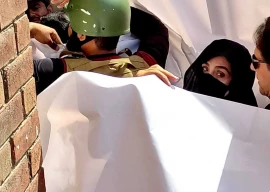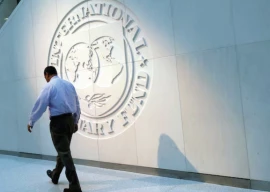
An anti-terrorism court in Lahore on Tuesday dismissed PTI founding chairman Imran Khan’s pre-arrest bails in three cases — including the one pertaining to the Jinnah House attack — registered against him in response to last year’s May 9 riots.
Apart from Lahore’s Jinnah House attack, Imran had filed the bails pleas in the FIRs registered against him for his alleged involvement in setting fire to Askari Tower and Shadman police station.
Before announcing the reserved decision, ATC Judge Khalid Arshad asked where were the lawyers representing the petitioner.
The judge was informed that senior lawyer Barrister Salman Safdar was in Islamabad while his junior associate was present in the courtroom but he was no longer there.
The ATC judge ordered the prosecution to contact Imran’s lawyers, observing that the court would announce it short order later in the day while the detailed one would be issued on Friday (tomorrow).
The ATC had reserved its decision on the pre-arrest bail petitions of the PTI founding chairman in the three cases after hearing detailed arguments from both sides on July 6.
During the previous proceedings, the judge had also directed the court staff to contact the authorities at Rawalpindi’s Adiala jail for producing Imran in the court through a video link.
After a short while, the court staff told the court that they were trying to contact the jail authorities but unable to do so.
To this, the ATC judge observed that the case could be proceeded ahead if the law officer gave a statement that Imran was present in Adiala jail.
On the court’s directives, the PTI founding chairman’s lawyer Safdar provided the court staff with the the Adiala jail superintendent’s cell phone number.
However, the proceedings were adjourned for half an hour with directions to the court staff to contact Adiala jail authorities to ascertain whether the petitioner was in the prison or not.
As the proceedings resumed, the ATC judge was told that the Adiala jail superintendent had confirmed the presence of the petitioner in prison through a message.
The judge made the message a part of the case record.
He later observed that there were directions issued by the Lahore High Court to mark the attendance of Imran through a video link.
“I just want to satisfy myself by seeing the petitioner through s video link,” he added.
Imran’s lawyer told the court that his client was being subjected to political victimidation.
He continued that he had never seen so many cases against an individual in politics.
He submitted to the court that Imran was being linked to those incidents that occurred at the time when he was in custody.
The lawyer told the court that his client had announced a hunger strike in jail, not to beg for mercy from the rulers but as a protest against a system “which is not providing him justice in these politically motivated cases registered against him with mala fide intent”.
The ATC judge remarked that the FIRs read that a conspiracy was hatched.
To this, Safdar replied that so far no date, time or any detail was shared with the defence team about these allegations.
The law officer opposed the bail pleas, contending that as per the Special Branch’s report, the PTI founding chairman instructed his party activists to attack civil and military installations in case he was arrested.
He argued that the May 9 violence occurred because of Imran’s instructions.
The law officer further told the court that evidence was yet to be examined at the time of the trial, not at the stage of bail proceedings.
He informed the court that there were posts available on the PTI founding chairman’s social media platform X, wherein these attacks were termed as the people’s real jihad for independence. At one point, the law officer said Imran had likened himself to the Quad-e-Azam and Allama Iqbal.
In response, Safdar argued that the law officer had taken the matters personally rather than debating on legal aspects.
The ATC judge asked whether someone’s claim about what they wrote online could be considered as a statement whether or not they were present at the scene.
The law officer replied in the affirmative.
The judge then asked if the report of the Special Branch wss acceptable in the court.
The law officer replied that the person who prepared the report would appear before the court as a witness.
After hearing detailed arguments from both the sides, the ATC judge reserved the decision.





1721122883-0/photo-collage-png-(5)1721122883-0-270x192.webp)












COMMENTS
Comments are moderated and generally will be posted if they are on-topic and not abusive.
For more information, please see our Comments FAQ